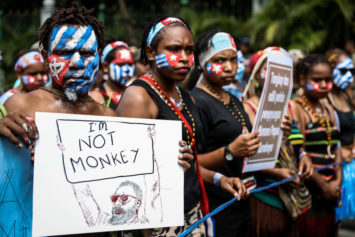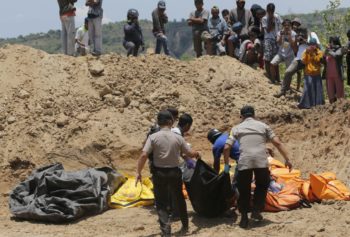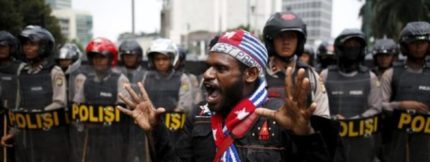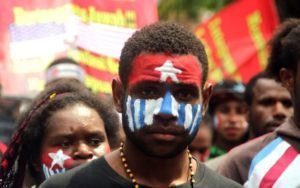
West Papuan, Man at demonstration for West Papua independence (Photo: AFP)
The ongoing struggle for independence in Indonesian-controlled West Papua continues, as the people fight back against five decades of brutality, terror and genocide. This was brought to light when a petition with the signatures of 1.8 million West Papuans — more than 70 percent of population — was presented to the United Nations Special Committee on Decolonization. The petition, banned in the provinces of Papua and West Papua by the Indonesia government, demands a free vote for independence from the Southeast Asian nation, and the appointment of a U.N. official to investigate claims of human rights abuses by the Indonesian security forces. Benny Wenda, the West Papuan independence leader living in exile in the United Kingdom, presented the petition to the international body in New York on Tuesday.
“Today, we hand over the bones of the people of West Papua to the United Nations and the world. After decades of suffering, decades of genocide, decades of occupation, today we open up the voice of the West Papuan people which lives inside this petition,” said Wenda, who is the spokesperson of the United Liberation Movement for West Papua in a statement. “We reject the Indonesian government’s fraudulent Act of NO Choice that was a gross violation of international law.”
Wenda noted the danger facing those who signed the petition — which was smuggled from village to village and from one end of the province to another — including 57 people who were arrested for supporting the campaign, and 54 who were tortured by the Indonesian security forces. One West Papuan leader supporting self-determination, Yanto Awerkion, faces 15 years imprisonment on charges of treason and rebellion for supporting the petition efforts after he was arrested and his office raided.
There is a huge mass movement inside #WestPapua for #HumanRights & #SelfDetermination. The world and #UNGA72 must hear our cry for freedom! pic.twitter.com/IIlQWJpbbn
— Benny Wenda (@BennyWenda) September 21, 2017
In the #WestPapuan People’s #Petition, my people are calling for our fundamental right to #SelfDetermination. #LetWestPapuaVote #UN pic.twitter.com/iupBF3JSX2
— Benny Wenda (@BennyWenda) September 28, 2017
Today, I delivered the West Papuan People’s Petition, singed by over 70% of my people, to the #UnitedNations. https://t.co/TlfEGqWMCj pic.twitter.com/ZYhtyR1HYk
— Benny Wenda (@BennyWenda) September 27, 2017
Exiled #WestPapuan @BennyWenda describes what it was like to present petition for independence to the #UnitedNations. pic.twitter.com/UcgnlVGFxq
— ABC News (@abcnews) September 28, 2017
In 1962, the Indonesian military occupied and annexed West Papua and killed 30,000 in a brutal process of political repression, after its people had declared independence from the Netherlands the previous year. West Papua had been assisted by the UN Special Committee of Decolonization — which is devoted to the process of independence for non-self-governing territories — but was dropped in 1963. In 1969, the Suharto regime declared the land a province of Indonesia and renamed Irian Jaya. Since that time, more than 100,000 civilians have been killed, according to the Free West Papua Campaign. The West Papuan people have also been subjected to kidnapping and abductions, torture, military and police crackdowns and arbitrary detention. Movement leaders are monitored, journalists’ freedoms violated, and elementary school children jailed for engaging in nonviolent protest. Papuans have referred to what they are suffering as a “slow motion genocide,” according to a report from the Catholic Justice and Peace Commission of the Archdiocese of Brisbane.
The United Nations, which sanctioned the annexation by Indonesia, does not consider West Papua to be colonized. In 2010, the Vanuatu Parliament passed a resolution to raise questions with the United Nations concerning the status of West Papua, specifically the legality of the 1962 U.S.-brokered agreement between Indonesia and the Netherlands that gave the United Nations temporary control of West Papua.
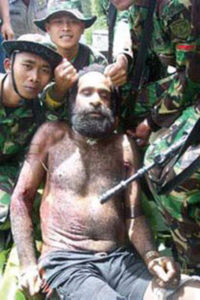
The Indonesian security forces have committed atrocities against the Melanesian people of West Papua, with more than 100,000 killed over five decades. (Photo: Twitter)
“As a non-self-governing territory with the right to full freedom and independence, we demand to be re-enlisted on the list of non-self-governing territories after being illegitimately removed in 1963,” Wenda said further. “We demand that our fundamental right to self-determination be peacefully exercised in an internationally supervised vote.”
Forming the western half of the island of New Guinea, West Papua is rich in resources and has been long exploited for its oil and minerals, with a $100 billion gold mine that is one of the world’s largest, and the third largest copper mine.
Recently, the Melanesian nations of Vanuatu and the Solomon Islands, the Polynesian nation of Tuvalu, and the Caribbean nation of Saint Vincent and the Grenadines made strong statements at the U.N. General Assembly in support of West Papuan self-determination, condemning Indonesia for the reported human rights abuses.
“For half a century now the international community has been witnessing a gamut of torture, murder, exploitation, sexual violence and arbitrary detention inflicted on the nationals of West Papua, perpetrated by Indonesia, but the international community has turned a deaf ear to the appeals for help. We urge the Human Rights Council to investigate these cases,” said Prime Minister Charlot Salwai of Vanuatu, invoking West Papua’s right to freedom from the “yoke of colonialism” and calling for an end to the violence.
Solomon Islands premier Manasseh Sogavare said the United Nations’ sustainable development objective of “no one left behind” would amount to empty promises if the United Nations does not actively address the plight of West Papua. “Failing this, we as a family of nations will become complicit in perpetuating the sufferings and becoming blind to the injustices, missing yet another golden opportunity to remain true to the saying of ‘leaving no one behind,’” he said.
Jeremy Corbyn, the leader of the UK Labour Party and cofounder of the International Parliamentarians for West Papua, has called for an independence vote. Britain, however, provides training and aid to the Indonesian police forces and is complicit in its human rights violations.
However, the Australian government, which has its own troubling legacy of colonization, theft and genocide of Black Aboriginal people, recognizes Indonesian sovereignty over the Papuan provinces. Australian Foreign Minister Julie Bishop called the issue a “bipartisan position in Australia,” claiming Indonesian sovereignty over the West Papua is “also widely recognized by the international community.” A wealthy nation with leadership status in the greater Asia-Pacific region, Australia has been accused of maintaining an “out of sight, out of mind” attitude towards Indonesian actions in West Papua, and of being complicit in the human rights abuses by training the Indonesian military units and supplying some of the helicopters used in slaughtering West Papuans.
However, Australia has also granted asylum to 42 West Papuan pro-independence activists who fled persecution, resulting in Indonesia recalling its ambassador. In addition, in 2015, the 14-member Pacific Islands Forum, of which Australia and New Zealand are members, agreed to send a mission to West Papua to investigate human rights abuses, a plan which the government of Indonesia wholly rejected. This year, the European Parliament passed a resolution calling on Indonesia to address human rights violations, including the treatment of Papuan pro-independence protesters.
The United States has participated with Indonesia in exploiting West Papua’s natural resources and supported the Indonesian takeover.
In response to the criticism at the United Nations, the government of Indonesia denied all allegations lodged against it. Ainan Nuran, a Third Secretary of Indonesia’s Permanent Mission in New York, accused the Melanesian leaders of supporting separatism in Indonesia and said the Papuan provinces of Papua and West Papua would always remain part of the country. “These countries were foolishly deceived by individuals with separatist agendas to exploit the issue of human rights. If human rights are at the heart of the issue, why were these concerns not raised in the appropriate forum, namely the 3rd Cycle of the Periodic Review of Indonesia at the United Nations Human Rights Council,” she said. Indonesia has been cited for restricting access by foreign journalists to West Papua, for military harassment, violence and intimidation against Papuan journalists, and for targeting supporters of West Papuan independence overseas.
Looking ahead, the Free West Papua Movement seeks a U.N. resolution to send international peacekeepers to West Papua and allow the people to vote for independence and self-determination. The richest Indonesian province in terms of mineral wealth and natural resources, yet the poorest in terms of the socioeconomic status of its people, West Papua seeks the power to chart its own course and demands release from under the boot of colonial oppression. While the international community arguably let West Papua down over the years, the United Nations now has an opportunity to reject Indonesia’s claim of sovereignty, expose the crimes of genocide against the Papuan people, and meet their demands for self-determination and decolonization.
